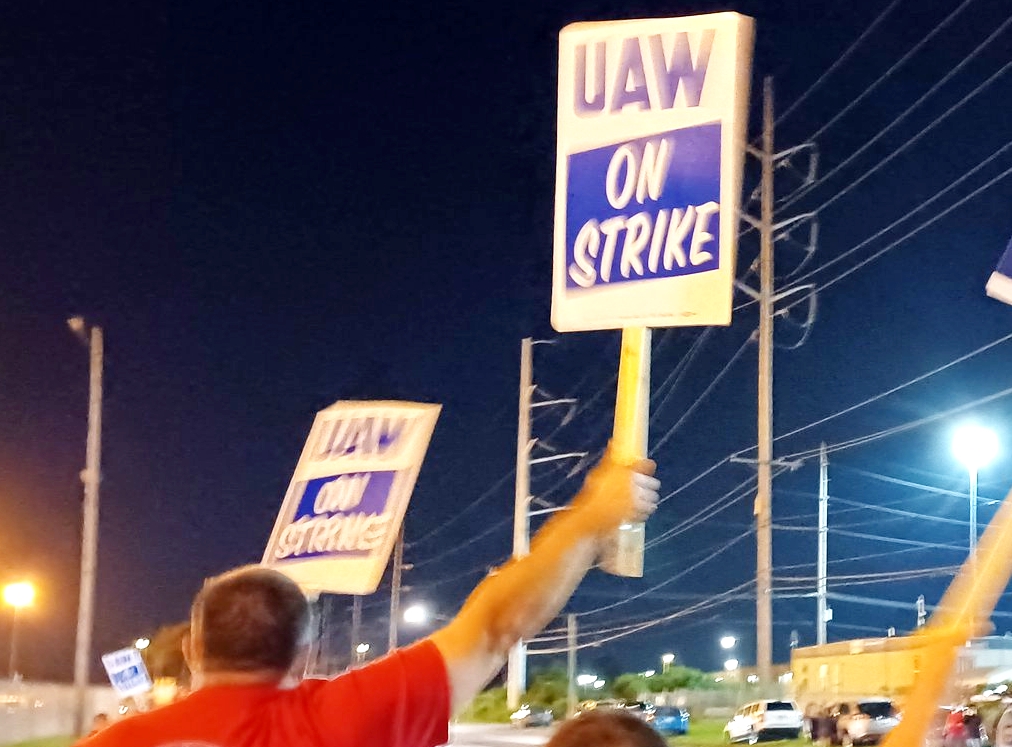Striking healthcare workers, part of the largest healthcare workers’ strike in U.S. history, are protesting against dangerous staffing shortages within their facilities….reports Asian Lite News
The biggest healthcare workers’ strike in US history has entered its second day after over 75,000 workers under the banner of Kaiser Permanenta walked out of their jobs, paralysing work in hospitals across the country.
The strike has hit hospitals across California, Colorado, Washington and Oregon as the workers are represented by a coalition of unions that comprise 40 per cent of Kaiser Permanente’s staff. Nearly 200 workers from Kaiser facilities in Virginia and Washington joined the picket lines for a single day on Wednesday as well, media reports said.
The work stoppage is, however, set to end early Saturday morning, but the coalition has warned that it’s planning a bigger and longer strike in November if a new employment contract is not negotiated by then, CNN reported.
In a statement on Wednesday, Hilary Costa, a spokesperson for Kaiser Permanente, said negotiations between the coalition and Kaiser ended without a settlement, but “a number of tentative agreements in bargaining” have been reached.
However, Caroline Lucas, a spokesperson for the union coalition, said in a statement that “frontline healthcare workers are awaiting a meaningful response from Kaiser Executives regarding some of their priorities that include safe staffing, outsourcing protections for incumbent healthcare workers, and fair wages to reduce turnover”.
The striking workers have termed the acute short-staffing situation as ‘dangerous’ and at the same time oppose outsourcing, that is, recruiting healthcare workers from other countries in Europe and Asia, including India and China, on lower wages.
The union coalition wants higher wages among other benefits and a proper strategy for working hours that have been long for their endurance due to staff shortage that has left them overworked and burnt out, particularly after the Covid 19 pandemic.
Those on strike from Kaiser also include nursing staff, dietary workers, receptionists, lab technicians, and pharmacists, reports said.
Ju-Anna Isaiah, a ward clerk transcriber for Kaiser Permanente on strike in Los Angeles told CNN that she is often the only person manning her unit due to lack of new hirings.
“Sometimes our OR [operating room] can be backed up if we can’t get patients out of the OR fast enough into the recovery unit,” she said.
“It’s really bad for the front-line health care workers when we’re trying to work with the patients and get them to where they need to be, but we don’t have the staff.”
Isaiah’s complaints are endorsed almost entirely by workers on the picket line. The union has called current staffing levels at Kaiser “unsafe,” and patient wait times “dangerous”.
James Bell, a radiology technologist, said some patients suffered falls getting out of bed after waiting too long for a staff member to get them out. Some of those patients have come to him for X-rays for those injuries.
In a statement, Kaiser Permanente said that labour shortages are an industry-wide phenomenon. Every healthcare provider in the nation has been facing staffing shortages and fighting burnouts of the workers. During the Great Resignation in 2021-22, more than 5 million people left their healthcare jobs across the country.
Up to two-third of healthcare staff are saying they are burnt out while more than 1 in 5 are quitting,” a spokesperson for Kaiser Permanente said.
Kaiser claimed it was aggressive in hiring more staff to fill up vacancies as it has committed to recruiting at least 10,000 more workers in union-represented jobs by the end of 2023.
Kaiser Permanente has offered wage increases per location with a 4% hike for each of the four years of the new contract, according to an October 1 update by the largest union in the coalition. The coalition has however rejected that offer saying it was not in consonance with the cost of living index.
Rocio Chacon, a striking Kaiser worker who serves on the union’s negotiating committee, said many employees cannot afford to live in the cities where they work due to the rising cost of living, and some workers resort to sleeping in their cars. “As we speak there are nurses that are sleeping in their cars for two reasons.
One, they can’t afford the cost of living here so they have to move two, three hours (away) and then because of short staff they’re working 14, 16 hours so they’re tired, Chacon said.
“So, their best choice is to be Monday through Friday in their cars.”
Kaiser Permanente said in a statement that it was leading the industry when it came to paying the workers under its banner.
“We lead total compensation in every market where we operate, and our proposals in bargaining would ensure we keep that position,” a spokesperson for Kaiser Permanente said in a statement.
“In some places, like in Southern California, a Kaiser Permanente employee leaving for a similar job at another organization would on average face a 20-plus percent pay cut and lower benefits.”
The unprecedented strike has unfortunately come at a time when there is heightened labor activity across the United States, with tens of thousands of workers across multiple industries from automobiles , civil aviation and others are taking to picket lines for better pay and benefits. Since the pandemic, health care workers in particular have been fighting for safer and more secure work environments. This is the first ever national strike effort at Kaiser Permanente.
According to an industry survey, temporary health care workers are the highest paid at anything between $21 to over $42 per hour consistent with experience as their jobs include high workload and tensions as compared to others in the industry who average out at $10 to $15 per hour in clerical, administrative or in groceries as maintenance staff.

